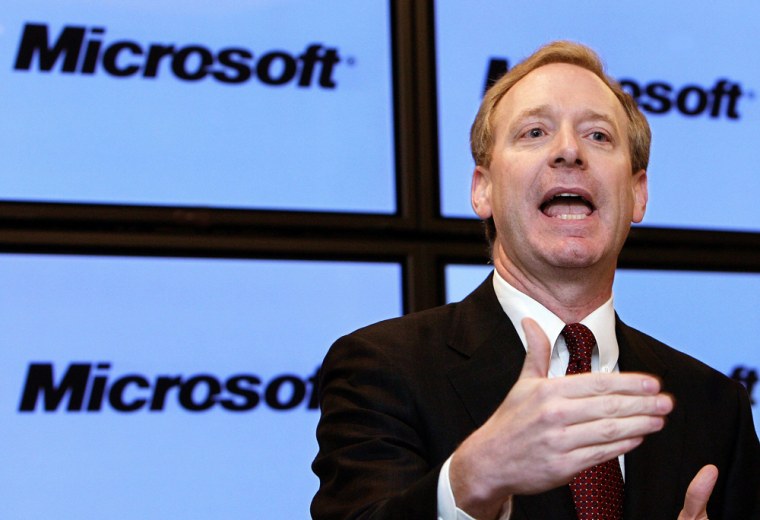Microsoft Corp. will license some of its secret software blueprints in an effort to avert fines of up to 2 million euros ($2.5 million) a day for failing to comply with European antitrust penalties, the U.S. company said on Wednesday.
“We are putting our most valuable intellectual property on the table, so we can put technical compliance issues to rest and move forward with a serious discussion about the substance of this case,” Microsoft general counsel Brad Smith said.
The European Commission said in a response three hours later that it would “study carefully the announcement” by Microsoft. (MSNBC.com is a Microsoft - NBC joint venture.)
Microsoft’s offer to license a small amount of its source code, relating to server software that helps manage tasks like printing within a group of desktop machines, would help proprietary software makers but not the so-called “open source” community.
Smith said he was telling a news conference, rather than the Commission, about the plan because “it now is a public issue” as the EU executive had revealed publicly its intention to impose the fines.
But a lawyer who represents opponents of Microsoft dismissed Smith’s comments as “purely a PR ploy” and said large amounts of source code would be entirely useless, even with 500 free hours of support promised by Microsoft.
“They would dump millions of lines of code and finding what competitors need to interoperate would be like looking for a needle in a haystack. Even the most sophisticated software engineers would be lost,” said Thomas Vinje.
The Commission decided in March 2004 that Microsoft had violated European Union antitrust laws by exploiting its dominant position to compete unfairly against other companies, and fined it 497 million euros.
Microsoft appealed against that decision to the Court of First Instance (CFI) in Luxembourg. Earlier in the day, the court announced a hearing on the full case would be heard before a 13-judge panel on April 24-28.
As part of the Commission’s decision, Microsoft was also supposed to offer rivals so-called protocols, or rules of the road, that would enable rival makers of server software to work as well with Microsoft’s Windows operating system as Microsoft server software does.
But a Microsoft-nominated trustee said that documentation to help rivals use its protocols was “fundamentally flawed”. Earlier this week, the U.S. Justice Department made similar complaints about Microsoft software being licensed there.
Price for licensing itself an issue
Smith was critical of the European trustee’s comments, but said that in any event the company’s offer would resolve all questions.
“The Windows source code is the ultimate documentation of Windows server technologies,” Smith said. “With this step our goal is to resolve all questions about the sufficiency of our technical documentation.”
Smith said all source code related to protocols in the Commission remedy would be made available, but only for inspection. It may not be used by licensees.
He said Microsoft would charge no extra money for the code beyond what it was already planning to charge for the protocol licenses.
At this point, however, the price Microsoft wants others to pay for licensing is itself an issue before the EU executive.
Critics of Microsoft contend that protocols are standard software and that Microsoft has used what is essentially a digital combination lock to make them inaccessible.
A Commission spokesman said if that turns out to be true then Microsoft has no right to charge for them.
However, Microsoft says that the protocols include valuable patents and that it should be able to charge for their use.
The Commission is examining the Microsoft argument.
The price that Microsoft charges for licensing and the clarity of its protocols documentation are the two issues which could lead to the daily fine of up to 2 million euros.
At least one of the groups affected rejected Smith’s proposals.
A lawyer for some “open source” software developers, who reveal their source code openly, said the offer was of no interest to his clients.
“It doesn’t solve any problems for us,” said Carlo Piana in Milan, Italy. During his news conference, Smith said the proposal was specifically not meant as an open source solution.
Piana, who is the lawyer for the Free Software Foundation Europe and Microsoft competitor Samba, said the licensing would be useful for non-open source developers.
“This demonstrates that Microsoft doesn’t fear very much competition from proprietry developers but rather from free software developers,” he said.
